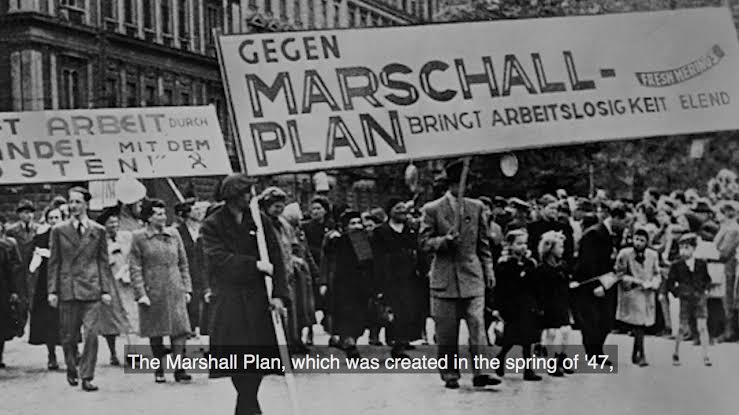The Marshall Plan in the Cold War was a strategy to turn former WW2 enemies into allies by rebuilding their shattered economies.
One of the enduring myths of early Cold War history involves the so-called Marshall Plan laid out by Secretary of State George Marshall in 1947. With Western Europe in economic ruin, some American policymakers suggested that massive injections of aid were necessary in order to jump-start those economies. An anti-Communist rationale was also offered for the program: Since Communism was thought to thrive amid conditions of poverty and despair, economic recovery in Western Europe would undercut whatever attraction Communist propaganda might hold there.
The Marshall Plan in the Cold War
The fact is that this program worked no better than any other government giveaway program. France, Germany, and Italy began their economic recoveries before any Marshall aid was disbursed. Austria and Greece, which received sizable amounts of Marshall aid per capita, began to recover only as it was being phased out. Britain received twice the Marshall aid that Germany did, yet British economic growth lagged far behind Germany’s over the next decade.
West Germany’s postwar economic recovery was so explosive, in fact, that the Germans actually coined a word—Wirtschaftwünder—to describe it. Naturally, Marshall Plan propagandists have attempted to take credit for the West German economic miracle. But the Wirtschaftwünder was the result not of Marshall Plan giveaways but of the market reforms that the Germans introduced.
Indeed, the return to some semblance of a market economy was what contributed to European prosperity. As economist Tyler Cowen points out, “In nearly every country occupied by Germany during the war, the stringent system of Nazi economic controls was continued even after the country was liberated. And in each case, rapid economic growth occurred only after the controls were lifted and sound economic policy established.” Marshall aid sometimes served to postpone the drastic economic measures that recipient nations would otherwise have had to make but which could be indefinitely delayed as long as American money kept coming.
This article is part of our larger selection of posts about American History. To learn more, click here for our comprehensive guide to American History.
This article is also part of our larger selection of posts about the Cold War. To learn more, click here for our comprehensive guide to the Cold War.
Cite This Article
"Marshall Plan in the Cold War" History on the Net© 2000-2024, Salem Media.
July 24, 2024 <https://www.historyonthenet.com/marshall-plan-cold-war>
More Citation Information.
